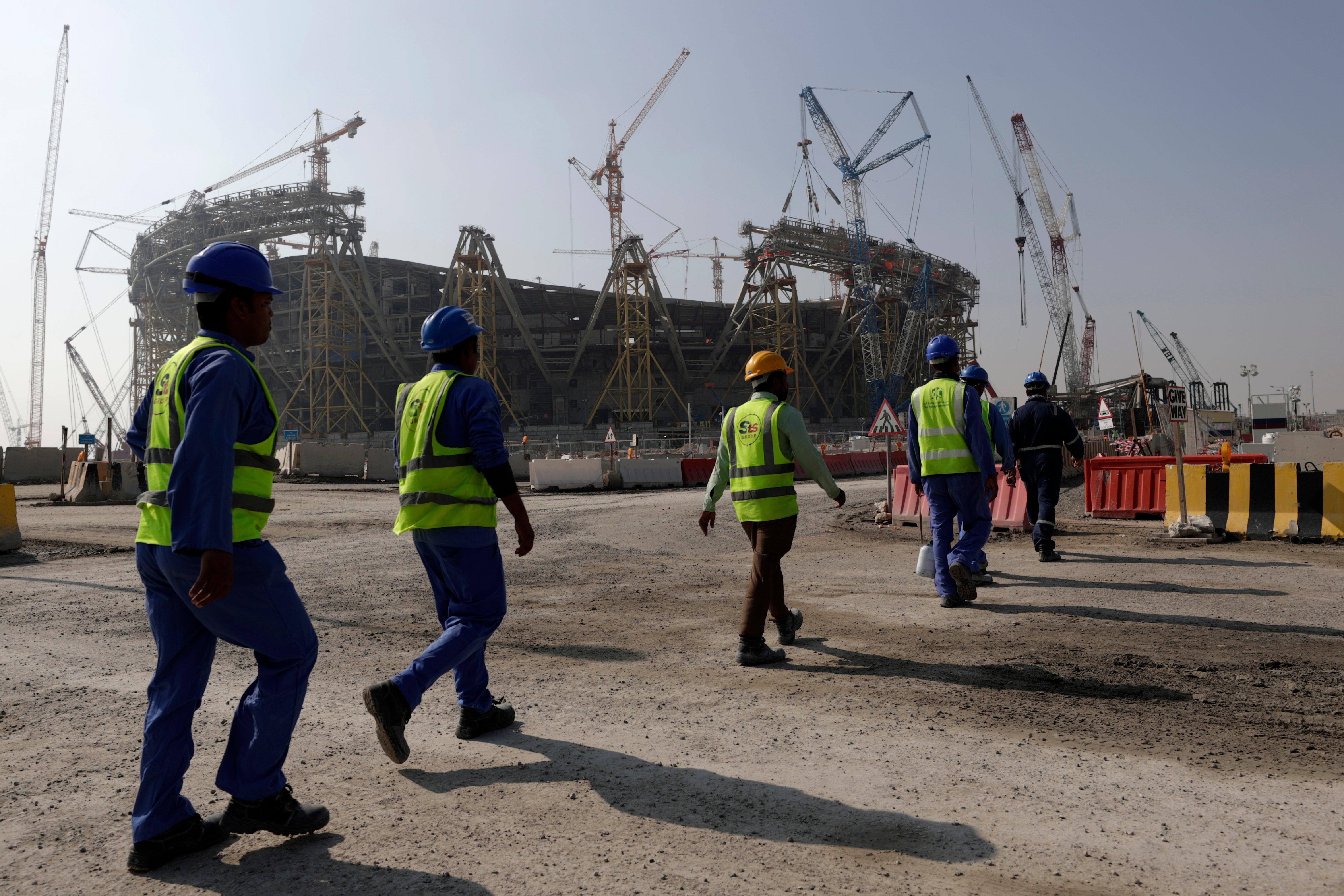Human Rights Watch condemns Fifa and Qatar over World Cup migrant workers’ recruitment fees
HRW interviewed more than 45 migrant workers who said they paid huge recruitment fees, which involved borrowing at high interest rates, selling assets and using savings

Your support helps us to tell the story
From reproductive rights to climate change to Big Tech, The Independent is on the ground when the story is developing. Whether it's investigating the financials of Elon Musk's pro-Trump PAC or producing our latest documentary, 'The A Word', which shines a light on the American women fighting for reproductive rights, we know how important it is to parse out the facts from the messaging.
At such a critical moment in US history, we need reporters on the ground. Your donation allows us to keep sending journalists to speak to both sides of the story.
The Independent is trusted by Americans across the entire political spectrum. And unlike many other quality news outlets, we choose not to lock Americans out of our reporting and analysis with paywalls. We believe quality journalism should be available to everyone, paid for by those who can afford it.
Your support makes all the difference.Migrant workers were still paying exorbitant and illegal recruitment fees in the year before the World Cup, Human Rights Watch has found, criticising both Fifa and Qatar for not yet committing to a remedy fund.
The body has warned that, without action, “the real legacy of this tournament will be how Fifa, Qatar, and anyone profiting from this World Cup left families of thousands of migrant workers indebted after they died and left many migrant workers who had their wages stolen uncompensated”.
HRW interviewed more than 45 migrant workers between November 2021 and October 2022, from Bangladesh, India, Kenya and Nepal, as well as seven families of deceased migrant workers, 26 recruiters, five Supreme Committee for Delivery and Legacy contractors and three migrant workers working in human resources departments. Labourers said they paid huge recruitment fees, which involved borrowing at high interest rates, selling assets and using savings. The workers were consequently left in debt bondage and unable to leave their job.
Such recruitment fees are illegal in Qatar, but remain a pervasive problem, which has raised questions about their willingness to tackle it. While the authorities have stated it falls outside their jurisdiction, there has been a failure to address the role Qatar-based businesses play in passing costs onto recruiters.
HRW found that such businesses are contributing to recruitment fees by imposing costs on recruiters that they know will be passed onto workers.
The interviews show that even the families of deceased workers have been left to deal with loan sharks demanding debt repayment caused by recruitment fees.
Bulani Sahani, the father of a Nepalese migrant worker who died in Qatar in 2022, struggled to take care of his grandchildren because his son had incurred debt from recruitment fees: “My son went [to Qatar] after borrowing money [$1,106] from many villagers. Now everyone keeps asking for it. They say that I must have received compensation for my son’s death, but I haven’t received a single rupee. How will I repay them? I don’t even have land to sell to pay them.”
HRW has argued that Fifa needs to establish a comprehensive programme to provide remedy for all abuses related to the 2022 World Cup. This has also been the call of the #PayUpFifa campaign, which is a collective human rights lobby asking for qualified federations to request this of the governing body. So far, only seven associations have publicly backed the call.
“With 30 days left until the tournament, there is a slim window for Fifa and Qatari authorities to correct course and commit to remedy past abuses that have stained the 2022 World Cup,” said Michael Page, deputy Middle East director at Human Rights Watch. “Unless FIFA and Qatar act, then the real ‘legacy’ of this tournament will be how Fifa, Qatar, and anyone profiting from this World Cup left families of thousands of migrant workers indebted after they died and left many migrant workers who had their wages stolen uncompensated.
“Qatari authorities, businesses, and Fifa had a dozen years to tackle the scourge of illegal exorbitant recruitment costs, but with small exceptions have failed to do so,” Page said. “Now the only way to fundamentally address the lost wages from recruitment fees is through a remedy fund for workers.”


Join our commenting forum
Join thought-provoking conversations, follow other Independent readers and see their replies
Comments